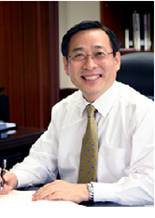
韩国金融研究院院长金泰俊
Tae Joon Kim, President of Korea Institute of Finance
金泰俊任韩国金融研究院主席;韩国对外经济政策研究院研究员;同德女子大学副校长;国家经济咨询委员会委员;韩国企划财政部公用事业评审小组成员;韩国企划财政部财政政策咨询委员会成员。
著作有:外汇市场干预的有效性(韩国对外经济政策研究院);韩国外汇市场压力及汇率政策;国际收支平衡软着陆及外汇市场干预的动力;资本自由化及股票和债券的不完全替代性;区域性货币一体化及两个超级大国;韩国金融开放的经济效应及政策影响。
Experience:
President, Korea Institute of Finance
Fellow, Korea Institute for International Economic Policy (KIEP)
Vice President, Dongduk Women's University
Member, National Economic Advisory Committee s
Member, Evaluation Group of Public Enterprises, Ministry of Strategy and Finance, Korea
Member, Fiscal Policy Advisory Committee, Ministry of Strategy and Finance, Korea
Publication:
The Effectiveness of Foreign Exchange Market Intervention, KIEP
Exchange Market Pressure and Exchange Rate Policy in Korea, KIEA
Balance of Payments Shocks and the Dynamics of Foreign Exchange Market Intervention, KMFA
Capital Liberalization and Incomplete Substitution between Stock and Bond, KIEP
"Regional Monetary Integration in the Presence of Two Large Countries", Japan and World Economy
Economic Effects and Policy Implications of Financial Opening in Korea, KIEP
Mr.Tae Joon Kim will make speech at China Finance Summit.
韩国金融研究院简介
韩国金融研究院是1991年于韩国创建的首家金融机构。成立之后的若干年里,我们团队的精英学者们致力于将韩国金融研究院打造为韩国卓越的综合金融研究中心,指导政策研究、促进韩国金融业的发展,与其他金融机构紧密合作以提高其竞争力。
经过深入研究短长期议题,韩国金融研究院找出以未来为导向的金融政策方案及具体的设计和一些可实行的计划,以促进韩国金融业的发展。
除了以上的工作以外,为跟上国际金融规则变化的步伐,我们将大力支持这些工作:比如提高公众对于现今重要的金融议题的理解力、满足其好奇心;阐明复杂的金融术语,等等。
The KIF was founded in 1991 as the first institute of its kind in Korea. In the years that have followed, the efforts of our team of leading scholars have propelled our institute into becoming Korea’s preeminent comprehensive financial research center, conducting policy research to further the development of Korea’s financial industry and working closely with financial institutions to boost their competitiveness.
Through in-depth research on both short- and long-term issues, the KIF seeks out future-oriented financial policy schemes and devises concrete, feasible strategies for the development of Korea’s financial industry.
In addition to these tasks, and in keeping pace with the changes in the international financial order, we shall greatly bolster our efforts to raise the general public’s understanding of, and address its curiosity regarding, today’s principal financial issues and to demystify the complex terminology of finance.
